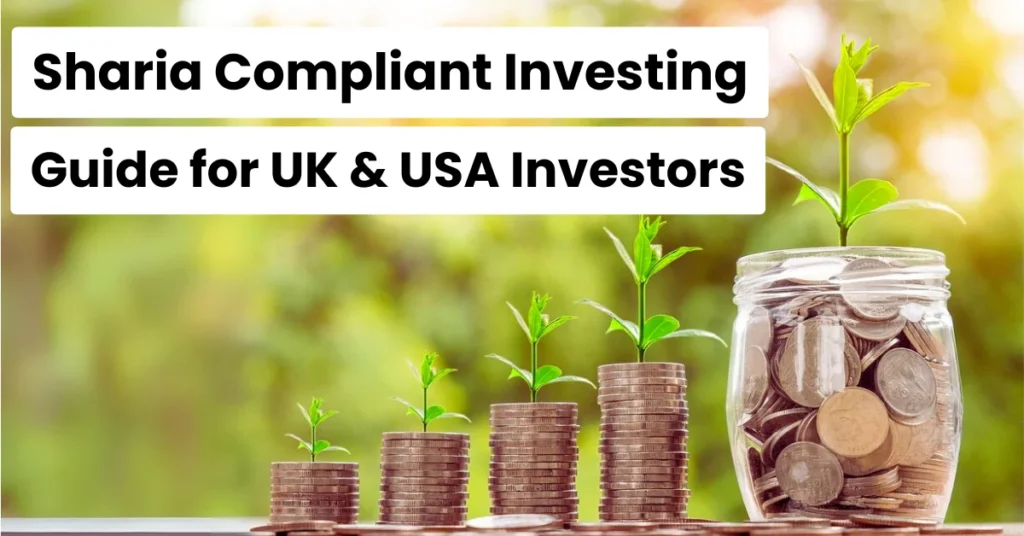
Wealth growth is possible for Muslims and ethical investors through Sharia compliant investing pathways, while maintaining compliance with Islamic principles. This approach avoids returns based on interest and involvement with harmful sectors. Investing ethically has shifted to Islamic finance due to the increase in interest and Islamic finance holdings globally. Therefore, investing ethically is understanding Sharia investing.
There has been an increase in Sharia law investments within the UK and the USA in recent years. The increase in both countries in the Muslim population has led to the seeking of faith-compatible financial products. The ethical screening in the Sharia-compliant investments sector has also been recognized by non-Muslim investors, and these Sharia compliant investments can be considered as a form of ESG investing.
We shall commence with addressing the mechanics of Sharia investments, the benefits of Sharia investments, and the practical ways a halal investment will be made in Western countries for the Western market.
What Makes an Investment Sharia Compliant?
Sharia-compliant investment seeks the Islamic law principles of financial transactions. These principles set the framework of how halal (permissible) and haram (forbidden) investments are structured. Having an understanding of these principles will ensure decisions made within Islamic compliance.
Principles of Islamic Finance
Understanding Islamic finance involves comprehension of the foremost Islamic perspectives of interest, usury, and riba. This makes Islamic finance incompatible with ordinary savings, interest-yielding financial instruments, and bonds. Instead, Sharia-compliant investments focus on profit and loss sharing on asset-based investments. The investors and their clients are in ventures together. Profit sharing means that both parties are profit and loss sharers in the loss.
In the same breath, Islamic finance principles entail the absence of gharar, which translates to extreme risk and speculation. This means that Islamic finance restricts derivatives, options, and other extreme speculation. Islam also forbids gambling, which means riddles, betting, and all lottery-based investments are considered unsuitable.
The Screening Process
Sharia investment involves multiple-tier qualitative and quantitative assessment processes. The qualitative assessment removes particular industries that are too ethically harmful or destructive. The health-harming or destructive industries considered haram include gambling, alcohol production, pork, tobacco, weapons, and adult entertainment.
The quantitative assessment looks at the financial ratios of otherwise permissible industries. For example, debt relative to overall capitalization should be below 33 % for Islamic finance to apply. For companies that rely on interest-bearing assets, the same 33% rule applies. Companies should also not earn more than 5 % either directly or indirectly on non-compliant activities.
Role of Sharia Boards
Sharia boards consisting of Sharia scholars independently verify the compliance of investments, and these boards carry out periodic reviews of compliance. In the UK, these roles are filled by the Islamic Finance Council, and similar oversight is in place in the USA by the Accounting and Auditing Organization for Islamic Financial Institutions.
Benefits of Sharia Compliant Investments
The benefits of Sharia compliant investing are numerous, and these extend to people outside of the compliance of the religion. The religion has also opened the investments to non-Muslims, offering them a potential for ethical and stable investments.
Ethical Investment Framework
Sharia investments cân only be made in certain ethical industries. This undoubtedly meets the demand for socially responsible investing. Investors do not wish to support firms involved in tobacco, weapons, and predatory practices. The absence of these industries and practices helps provide investors with a sense of security.
Risk Management Features
The prohibition of excessive leverage and speculation may reduce portfolio volatility. Companies passing Sharia-compliant investment screening typically maintain healthier balance sheets. Having a low debt ratio and therefore providing more financial security is priceless in tough economic times. This unleveraged position is preferred by investors who are averse to risk.
Growing Market Opportunities
The Islamic finance market is more than $3 trillion. Both the UK and the USA are expanding their Sharia law investments offerings. London has established itself as a Western hub for Islamic finance. Major US financial institutions now offer halal investment products. This growth creates diverse opportunities for investors.
Accessibility for All Investors
Sharia investments are not exclusive to Muslims. Non-Muslim ethical investors find these products align with their values. The focus on ethical sectors and stable companies attracts investors seeking responsible options. Anyone who wishes to invest in sharia-compliant funds must do so in accordance with the exposure limits.
Popular Ways to Invest Following Sharia Principles
Understanding different types of best Sharia compliant investments begins with understanding the different categories available. From an investment perspective, each choice has different features that cater to different investment objectives and varying levels of risk.
Halal Stocks and ETFs
Sharia-compliant stocks pass both qualitative and quantitative screening. Technology companies like Apple and Microsoft often qualify. Healthcare and consumer goods sectors also provide halal options.
Islamic Mutual Funds
Mutual funds following sharia principles pool investor capital for professional management. The Amana Mutual Funds and Azzad Funds are prominent US examples. For example, UK investors can purchase the HSBC Islamic Global Equity Index Fund and later include the SP Funds S&P 500 Sharia Industry Exclusions ETF, which provides diversified exposure as an ETF and automatically screens and rebalances holdings for compliance.
These UK funds ensure compliance as they monitor holdings and also pay profits as dividends instead of interest. These instruments provide fixed-income alternatives for Muslim investors. Governments and corporations issue sukuk for infrastructure and development projects. The UK government has issued sovereign sukuk multiple times. Returns come from asset-generated income rather than interest. Sharia-Compliant Real Estate Funds. Real estate investment trusts (REITs) structured according to Islamic principles offer property exposure.
These funds invest in commercial and residential properties. Rental income provides returns without interest involvement. Some UK property funds cater specifically to Muslim investors seeking halal real estate opportunities.
Sukuk (Islamic Bonds)
Since Islamic bonds or Sukuk represent ownership of tangible assets as opposed to debt obligations, Sukuk reliance can be less stressful.
Al Rayan Bank and Gatehouse Bank provide such products. Returns depend on bank profitability rather than predetermined interest rates. US options remain limited but are gradually expanding.

How to Start Sharia-Compliant Investing in the UK & USA
Starting to invest in Sharia-compliant products in the UK is pretty straightforward, as they have Wahed Invest and other Islamic banks.
Both countries offer growing options for Muslim investors.
Choosing Certified Platforms
Select brokers and platforms that clearly indicate Sharia certification. In the USA, Wahed provides similar services. These accounts pay interest, and funds need to be confirmed as Sharia-compliant.
US investors can access similar services through Wahed or traditional brokers offering halal funds.
Major brokers of the UK, for example, Hargreaves Lansdown and AJ Bell, list Islamic funds. US platforms, including Fidelity and Charles Schwab, offer access to halal mutual funds.
Due Diligence and Verification
Check for official Sharia board approval on any investment product. Reputable funds display certification prominently in their documentation. Research the scholars serving on Sharia boards for credibility. AAOIFI standards provide internationally recognized compliance guidelines.
Use screening tools like Zoya or Islamicly to verify individual stocks. These apps check the real-time compliance status of publicly traded companies. Many automatically flag when holdings become non-compliant.
UK Tax Considerations
Sharia investments in the UK follow standard capital gains tax rules. Annual CGT allowances apply equally to halal investments. ISAs (Individual Savings Accounts) can hold some sharia-compliant funds. This provides tax-free growth opportunities. Consult tax advisors familiar with Islamic finance for guidance.
USA Tax Implications
US investors pay standard capital gains taxes on Sharia law investments. Qualified dividends from halal stocks receive preferential tax treatment. Roth IRAs and traditional IRAs can hold Sharia-compliant mutual funds. Sukuk income may face different tax treatment than conventional bonds. Professional tax advice ensures proper reporting and optimization.
Risks and Challenges of Sharia Investment Law
While Sharia-compliant investment offers ethical benefits, investors must also understand the inherent challenges and limits.
Limited Product Selection
Sharia screening significantly narrows the investment universe. Many popular stocks and sectors become unavailable. This limitation may reduce diversification opportunities compared to conventional portfolios. Financial services and entertainment sectors are largely excluded. Investors need creativity to build well-diversified halal portfolios.
Market Performance Factors
Sharia investments also face the market risks that are the same as conventional investments. Stock prices fluctuate based on economic conditions, company performance, etc. No investment is guaranteed to be profitable. The ethical screening does not eliminate financial risk. Investors should maintain realistic expectations about returns.
Ongoing Compliance Requirements
Companies can lose Sharia certification if their business practices change. Regular monitoring ensures continued compliance with holdings. Some funds automatically rebalance when companies become non-compliant. Individual stock investors must track compliance status themselves. This requires additional effort compared to conventional investing.
Geographic Availability Variations
The USA lags behind the UK in Sharia investment product availability. American Muslims often have fewer local options. This may require working with international platforms or specialized advisors. The market continues to develop but remains less mature than in Muslim-majority countries.
The Two Approaches in Investing: Sharia-Compliant vs Conventional
Investors should understand the similarities and differences so as to make reasonable decisions in choosing a Sharia and a conventional method.
Identical Outcomes
Studies conducted on different academic fields suggest that Sharia-compliant portfolios yield the same results as conventional portfolios in the long run, as the ethical screening of investments does not automatically improve or deteriorate financial returns. Market factors affect both investment types similarly. Some research suggests lower volatility in Islamic portfolios due to debt restrictions.
Fundamental Differences
The prohibition of interest represents the most significant distinction. Conventional investing includes bonds, interest-bearing accounts, and leveraged instruments. Sharia investing replaces these with profit-sharing arrangements and asset-backed alternatives. This changes portfolio construction and income generation strategies.
Ethical screening is mandatory in Sharia investments but optional in conventional investing. Islamic finance integrates values into every investment decision. Conventional ESG investing shares similarities but lacks a religious foundation. The screening methodologies differ in their specific exclusions and requirements.
Investment Structure Variations
Conventional investments often involve debt financing and leverage. Sharia alternatives emphasize equity participation and asset ownership. This fundamental difference affects how returns are generated and distributed. Although Islamic finance structures may seem more complicated at first, they are based on definable principles.
Finding the Best Sharia-Compliant Investments: Advice
Finding good Sharia law investments involves considerable groundwork and clever strategizing. The following tips are designed to assist investors in creating halal portfolios.
Assess the Quality of Fund Management
Do due diligence on Sharia investment fund managers and their managers. Fund managers with experience tend to appreciate the symbiosis between Islamic and market shifts. A historical performance review should be done for varying market conditions. Management fees should be checked to get a sense of whether the price is reasonable. Higher fees are justifiable if they are aligned.
Evaluate the Sharia Board’s Expertise
Assess the scholars on Sharia boards. For a board to be reputable, it has to comprise leading Islamic law and finance scholars. The quality of the institution is based on the transparency of the board. Some boards provide a detailed explanation of their rationale for compliance.
Use a Diversification Strategy
Use various asset classes and levels of geography to minimize the risk of catastrophic loss. For a balanced approach, use a mix of halal equities, sukuk, and Islamic equity real estate funds. The investment portfolio should comprise wealth that is to be distributed and wealth that is to be grown.
Reducing the effect of each investment’s underperformance can be achieved through portfolio diversification. For global diversification, consider sharia-compliant.
Overseeing Compliance
Arrange to conduct compliance reviews every quarter. Keep subscription updates from screening tools and fund providers. Quickly resolve any issues that arise to avoid non-compliance. A hands-on strategy in addressing gaps defends the portfolio against non-compliance with Islamic principles. Annual reviews proactively avoid the unintended build-up of haram investments.
Starting Small
Investing in sharia principles can be most readily practiced through small investments. On Islamic finance products, the principles focus on increasing exposure to investment as self-confidence improves. Religious fund advisors should be sought out. Investing education reduces risk and promotes success in investments.

Conclusion
Investing in accordance with Sharia law is a valid approach to ethical wealth-building within Islam. Halal investing has become even more available with more Sharia compliant investing opportunities in the UK and the USA. Stemmed with screened stocks and ETFs, sukuk and Islamic mutual funds, and even Islamic ethical opportunities, there is ample choice to construct a balanced portfolio.
The best Sharia compliant investment options integrate Islam with viable business. Although there are scant options available, the ethical concerns of investment and the alignment of core social values help to build a sustainable and socially responsible portfolio. The exclusion of interest investments and ethically negative enterprises helps build a portfolio that is sustainable and socially responsible.
Embarking on Sharia star or expanding a halal portfolio requires substantial research to be effective. Gather certifications, check compliance rules, and spread across asset classes.
Would you like to start investing along Islamic principles with ethical options? Work with an Islamic finance advisor in your area or look for Sharia law-compliant investing options in your area.
Summery
Sharia compliant investing allows Muslims (and ethical investors) to grow their wealth while maintaining Islamic principles. Such investing avoids interest-based returns and excludes industries like alcohol, gambling, and weapons manufacturing.
Sharia law investments undergoes rigorous evaluations of business activities and financial ratios for investments. Independent Sharia boards approve investments for ongoing compliance. Halal stocks, Islamic ETFs, sukuk (Islamic bonds), and Sharia-compliant mutual funds are some available options.
The best Sharia compliant investments have ethical screening like ESG investing and deliver competitive returns over the long term. Sharia investment products are increasingly available on specialized platforms like Wahed Invest and major brokers in both the UK and the US, who provide Sharia-compliant funds.
The limited range of products and ongoing compliance monitoring pose challenges for Sharia investing. Yet, ethical congruence, lower volatility (due to debt restrictions), and being part of the $3 trillion global Islamic finance market are a few profound benefits.
Sharia-compliant investing can be started on certified platforms by Muslims and non-Muslims.
Table of Content
Table of Contents
ToggleAbout Company
PakCyptoInfo is a team of crypto enthusiasts, traders on a mission to simplify digital currency for everyone. We are dedicated to providing innovative solutions tailored to your needs. With a focus on quality and customer satisfaction, our team works tirelessly to ensure your experience with us is seamless and rewarding.
Most Recent Posts
- All Posts
- Crypto and Islam
- Crypto News
- Featured Personalities
- Pak Crypto News
- PakCryptoInfo Blogs
Top Crypto Coins

Bitcoin (BTC)

Ethereum (ETH)

XRP (XRP)
BNB (BNB)

Dogecoin (DOGE)

Cardano (ADA)

Bitcoin Cash (BCH)

Litecoin (LTC)

Sui (SUI)

Polkadot (DOT)

Solana (SOL)

Arbitrum (ARB)

Dash (DASH)
Follow on Social Media
Buy Crypto
If your are beginner and want to start your journey in crypto also want to get the basic guide we can help you to start your crypto journey in buying crypto and many more.
We can Help to Promote your Business
FAQs
Long-term sharia investments and sharia-compliant finance and conventional finance investments perform equivalently. Investing ethically while making a profit is possible because Islamic portfolios demonstrate equivalent returns. The key is good diversification and quality investments.
Of course. Sharia investments are open to all regardless of faith. Islamic funds are ethically aligned, and non Muslims often use them as values-based screening. The investment values are aligned with socially responsible investments in funds regardless of religious beliefs.
When it comes to recomposition, reputable Sharia-compliant funds remove non-compliant companies. Individual investors should dispose of the non-compliant investment. The purification process is considered a donation of entrenched non-compliant earnings to charity, as some scholars of Islamic finance have suggested.




 Tether
Tether  USDC
USDC  TRON
TRON  Lido Staked Ether
Lido Staked Ether
1 Comment
I read the whole article and it really helps a lot.
Superb words simple guide